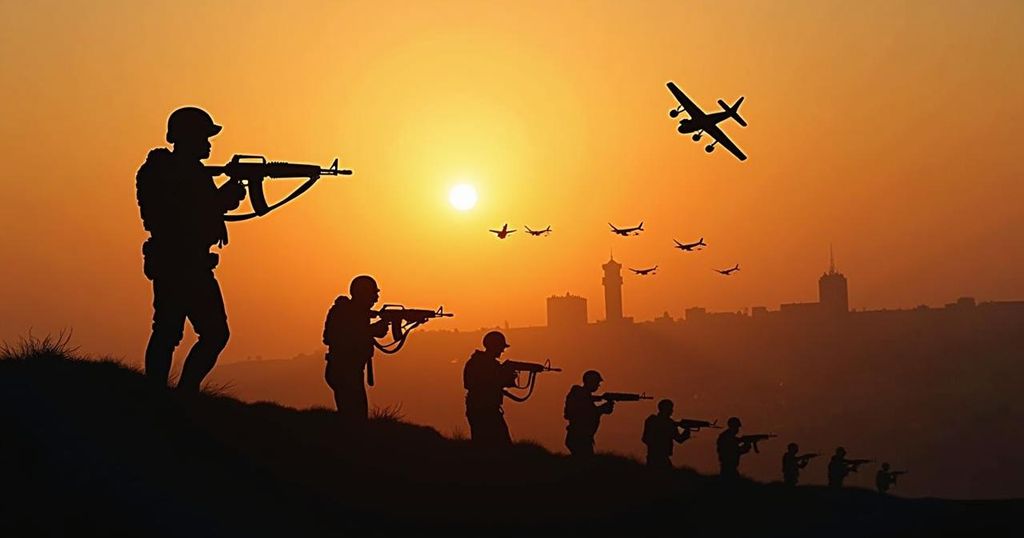Escalation of Conflict: Iran’s Attacks on Israel and Regional Implications
Israeli Prime Minister Benjamin Netanyahu vowed retaliation against Iran for launching over 180 ballistic missiles at Israel. The United States supported Israel’s defense, intercepting most of the attacks and denouncing Iran’s aggression. Meanwhile, Israel escalated military operations in Lebanon, resulting in significant casualties. The international community has responded by calling for emergency discussions to address the worsening crisis.
On a day marked by increased hostilities, Israeli Prime Minister Benjamin Netanyahu declared that Iran would face repercussions for the recent missile attack in which over 180 ballistic missiles were launched towards Israel. In response, Israel and its ally, the United States, successfully intercepted a significant portion of these missiles. Iranian officials claimed that 90% of their Fattah missiles effectively struck military bases. U.S. President Joe Biden underscored the United States’ support for Israel, stating, “The attack appears to have been defeated and ineffective, and this is a testament to Israeli military capability and the US military.” He reiterated America’s unwavering support for Israel. Iran justified its actions as a defensive measure, asserting that it was retaliation against Israel’s alleged killings of militant leaders and strikes in Lebanon. Iranian Foreign Minister Abbas Araqchi indicated that any further military actions would depend on Israel’s provocations. On the ground, Israel intensified its military operations in Lebanon, resulting in a reported 55 fatalities and 156 injuries, as confirmed by the Lebanese health ministry. In light of the escalating violence, the United Nations Security Council has convened an emergency meeting to address the situation. The former Israeli Prime Minister, Naftali Bennett, suggested that Israel must take advantage of the current turmoil to dismantle Iran’s nuclear ambitions, describing these circumstances as the nation’s greatest opportunity in fifty years to redefine the geopolitical landscape of the Middle East. Additionally, Hamas commended Iran’s missile strikes, framing them as a response to Israeli aggression after significant casualties were reported in Lebanon. French President Emmanuel Macron condemned Iran’s actions and expressed support for Lebanon’s sovereignty. On Wednesday, Israeli forces executed five separate air raids in southern Beirut, following earlier strikes that caused substantial civilian casualties. With tensions at a boiling point, Israel and the U.S. have pledged to respond decisively to Iran’s aggressive actions, with Netanyahu warning that Iran would “pay the price.”
The tensions between Iran and Israel have culminated in a series of retaliatory attacks, significantly intensifying the conflict in the region. The recent missile engagement, which saw Iran targeting Israel from its territory, marks a critical escalation in hostilities and showcases the broader geopolitical struggles involving influential regional actors like Hamas and Lebanon. Iran’s claims of acting defensively and the backdrop of past military strikes provided by Israel offer a complex narrative that contributes to the increasing volatility. The implications of these actions reverberate across international diplomatic avenues, as responses from the United States and allies indicate a potential for broader military engagements. In addition to military confrontations, significant casualties in Lebanon have raised concerns of a humanitarian crisis, prompting international calls for restraint and dialogue. Previous tensions surrounding Iran’s nuclear program have compounded these conflicts, contributing to a precarious situation that necessitates careful international management to avert further escalation.
In summary, the recent hostilities between Iran and Israel represent a significant escalation in an already volatile geopolitical landscape. The exchange of missile strikes and subsequent military actions has resulted in tragic civilian casualties and a strong international response. As both nations prepare for potential retaliatory actions, the situation calls for vigilant monitoring and diplomatic engagement to prevent further loss of life and promote stability in the region. The declarations from international leaders reinforce the need for a coordinated approach to address the underlying tensions that fuel such conflicts.
Original Source: www.hindustantimes.com




Post Comment